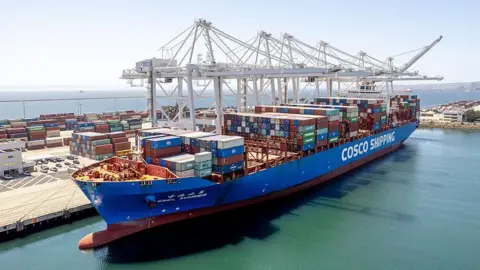
In a move that signals growing tensions in global trade relations, the United States has announced plans to impose new port charges on vessels originating from China. The proposed measures are part of a broader strategy aimed at addressing what the U.S. government describes as unfair trade practices and China’s increasing dominance in key maritime supply chains. While the details of the plan are still unfolding, the implications could be significant for international shipping, trade policy, and geopolitical relations between the world’s two largest economies.
According to officials, the port fees would apply to Chinese commercial vessels docking at American ports, especially those transporting goods deemed sensitive to national security or critical infrastructure. The move follows mounting concerns in Washington over the potential security risks posed by China’s growing footprint in global logistics networks, including its investment in port infrastructure across the world and the operations of Chinese state-backed shipping giants.
The Biden administration has framed the plan as part of a broader effort to protect domestic industries, bolster economic security, and level the playing field for American businesses. “China’s dominance in the maritime shipping sector and its aggressive trade practices have long given it an unfair advantage,” one U.S. trade official noted. “These port fees are a targeted response to reassert control over our own economic interests.”
The proposed port charges come at a time when both countries are navigating a complex and often tense economic relationship. While tariffs and export controls have been major tools in the past, this shift to logistics and maritime policy reflects a new front in the competition. By targeting shipping costs directly, the U.S. hopes to disrupt what it views as a strategic leverage point for China.
Reactions from industry stakeholders have been mixed. Some American shipping and logistics companies welcome the move as a way to reduce Chinese competition and revitalize U.S. maritime infrastructure. Others, including importers and retailers, warn that the new fees could lead to higher prices and logistical bottlenecks, particularly if China retaliates with its own restrictions or tariffs.
China has yet to issue a formal response, but experts anticipate that countermeasures are likely if the U.S. proceeds with implementation. Chinese state media has previously criticized similar moves as “economic coercion” and has argued that such actions undermine global trade norms.
Analysts say the long-term impact of the proposed port fees will depend on several factors, including the scope of the charges, whether U.S. allies adopt similar measures, and how China chooses to respond. There is also the question of whether the fees could backfire by increasing costs for U.S. consumers or disrupting already fragile supply chains.
For now, the announcement marks yet another chapter in the evolving U.S.–China rivalry—one that increasingly plays out not just in boardrooms and trade negotiations, but also at the very docks where global commerce flows.